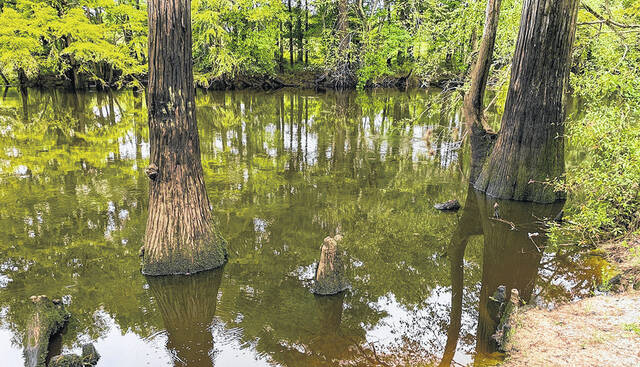
Cypress knees poke through high water on the Lumber River at James L. Stephens Memorial Park.
File Photo | The Robesonian
ROBESON COUNTY — The Open Space Institute (OSI) and Lumbee Tribe of North Carolina have announced the acquisition of the 1,382-acre Camp Island property near North Carolina’s southeastern border.
OSI acquired the property with funding support from a private family foundation and a North American Wetlands Conservation Act (NAWCA) grant facilitated by Ducks Unlimited (DU). OSI has donated the property, rich with cultural significance and natural resources, to the Lumbee Tribe of North Carolina, who will steward the forested property in perpetuity as a natural and cultural resource for the Tribe.
OSI and the Lumbee Tribe were scheduled to celebrate the acquisition in a ceremony on Tuesday.
The Camp Island project represents the first opportunity to establish a large, protected natural area under the stewardship of the state’s Lumbee Tribe.
“Properties like Camp Island play a vital role not only in the health of ecosystems, but also in the lives of the people tied to the land itself,” said Dr. Maria Whitehead, OSI’s senior vice president of Land for the Southeast. “OSI is honored to be part of this effort to preserve culturally significant land, and thanks to our partners, we have the incredible opportunity to return it to tribal stewardship and care.”
Lumbee Tribal Chairman John Lowery said he is “excited” to reconnect with this land, “which we’ve not been able to access for a very long time.”
“Our people are outdoors people, and the ability to steward this land for Lumbee and visitors alike is truly special,” Lowery said. “We are proud to preserve Camp Island for many years to come.”
The Camp Island property is especially important to the Lumbee Tribe as a cultural site where significant Indigenous artifacts have been found. The Lumbee Tribe operates several camps where participants engage in preservation and restoration activities, while deepening an understanding of their cultural heritage. Protecting Camp Island is a critical step toward imparting these values to future generations.
“This gift will give our youth an opportunity to learn about native plants, trees, birds, and local wildlife,” said Homer Fields, Lumbee Tribal Council Representative (District 14), who represents the Allenton Community where Camp Island is located. “We’re thrilled about this project.”
“We are truly grateful that OSI is cultivating community through their cultural sensitivities to address our reconnection to Mother Earth,” said Wendy Moore, Former Lumbee Tribal Council Representative and Former Chair of the Agriculture and Natural Resources Committee.
The benefits of the Camp Island project extend beyond the Lumbee Tribe. The property, which was once managed for wood products, will now be stewarded for forest and species conservation by the Tribe, and protected in perpetuity by the NAWCA grant agreement and other deed restrictions. It will become part of a larger network of protected properties in a “green corridor” between the Lumber and Cape Fear river basins.
Primarily forested wetland, the Camp Island property contains a vast matrix of blackwater swamps that drain directly into the Lumber River, a state-designated Scenic River that is considered one of North Carolina’s most pristine recreational assets and home to fish species like the Broadtail Madtom and Ironcolor Shiner. The Lumber River is known traditionally as the Lumbee River; its name was changed by state lawmakers in 1809 to reflect its use in timbering operations, but it is still known by the Lumbee People as the Lumbee River.
With abundant intact forested wetlands, the tract is within a designated Atlantic Coast Joint Venture Waterfowl Focus Area and Audubon Important Bird Area boasting, among other bird species, Yellowthroated Warblers, Great Blue and Green Herons, Swallow-tailed Kites, and Wood Storks.
“We’re excited to join forces with OSI and the Lumbee Tribe to fund a project that holds tremendous value for wetlands, wildlife and the community,” said Emily Purcell, DU Director, Conservation Programs Southeast. “Collaboration drives conservation forward, and we’re honored to play a role in safeguarding Camp Island for future generations of the Lumbee Tribe to connect with their ancestral lands.”
In addition to being an important site for American Indian history and culture, in addition to natural resources, the Camp Island property has a long and storied history as a colonial-era British loyalist encampment, purportedly attacked by a group of the Camden District Regiment militia. In the 1850s, enslaved people who had escaped established a small community on the property with livestock and cultivated crops.
